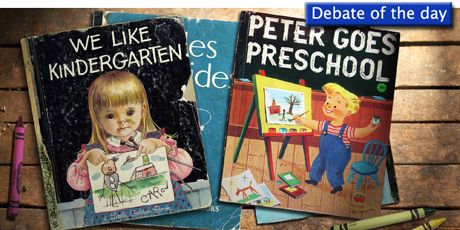Update 5/10/12: Make a submission: Reject compulsory Early Education for 3 year olds
~~~~~~~~~~~~~~~~~~~~~~~~~~~~~~~~~~~~~~~~~~~~~~~~~~~~~~~~~~~~~
Should preschool be compulsory?

To read whole article and to vote in poll click here
Jane Silloway Smith: No. Better parenting helps kids’ lives, not preschool
The Government’s announcement last week that all beneficiary parents will be required to send their children to early childhood education (ECE) for at least 15 hours a week from age three was signalled as a way to ensure children of beneficiaries “get the best possible start in life”. Despite good intentions, making preschool compulsory could ultimately do more harm than good by undermining instead of strengthening children’s most critical relationships.
The case for compulsory preschooling seems, on the surface, to be a compelling one. Evidence from many reputable sources indicates that attendance at high-quality ECE can enable children from disadvantaged backgrounds to narrow the achievement gaps with their more advantaged peers in terms of school readiness. So, children of beneficiaries go to ECE; they get better prepared for school; their life chances improve; and the Government avoids the social and financial costs of future negative outcomes for these children. A win-win for all, right?
Not quite. ECE has been shown to benefit children from disadvantaged backgrounds because these children often lack what their more advantaged peers have: a nurturing home environment. Educational researchers regularly report that a nurturing home environment will have a more profound impact on a child’s educational achievement than preschool programmes – a reason often stated for why more advantaged children are not often found to gain much, if anything, educationally from ECE.
So making preschooling compulsory for the children of beneficiaries actually dodges the most critical factor for a child’s future – their home environment. Most child development experts will tell you children need a good home in which they are able to form an attachment to their parents for proper development. For that to occur, parents need to be nurturing and interacting with their children: talking to them, cuddling them, and generally taking an interest in their lives.
Many parents on a benefit are doing a good job with all that, despite the financial and employment obstacles they may be facing. It would be a mistake, then, to force them to put their children in ECE when other options may be more suitable.
Though good parents abound, we must face the reality that some are not properly nurturing and interacting with their children. Yet taking decision-making away from parents in dysfunctional situations, as compulsory preschooling would do, absolves them of their responsibility for their children and does nothing to correct the most pressing problem: poor parenting. No amount of high-quality ECE will ever make up for this lack…
In the end, what’s best for children is to grow up in a stable family with parents who are nurturing and interested in their development. Compulsory preschool won’t ensure this; indeed, it may undermine it.
* Dr Jane Silloway Smith is research manager for the Maxim Institute, an independent research and public policy think tank, incorporated as a charitable trust. For more details, see www.maxim.org.nz
~~~~~~~~~~~~~~~~~~~~~~~~~~~~~~~~~~~~~~~~~~~~~~~~~~~~~~~~~~~~~~
From the Smiths:
https://hef.org.nz/2011/craig-smith-26-january-1951-to-30-september-2011/
Updated 23 September 2012: Life for Those Left Behind (Craig Smith’s Health) page 6 click here
Needing help for your home schooling journey:
https://hef.org.nz/2011/needing-help-for-your-home-schooling-journey-2/
And
Here are a couple of links to get you started home schooling:
https://hef.org.nz/getting-started-2/
and
https://hef.org.nz/exemptions/
This link is motivational:
https://hef.org.nz/2012/home-schooling-what-is-it-all-about/
I agree with the above argument, and would like to add, that THE key factor in the advantages of ECE is QUALITY. This article http://www.odt.co.nz/news/dunedin/215396/studies-child-care-spark-hope points out that the major contributing factor of quality is the number of teachers at the centre that have a minimum of a 3 year full-time course of study in ece, called either a diploma of teaching (ECE) or diploma of teaching (Early Years).
Some 20 years ago, the then Labour government determined that by the year 2000 ALL ECE teachers would have a minimum of this qualification. Subsequent National governments have persistently and consistently denigrated this and actively worked towards elminating this goal.
IF children are going to be removed from the irreplaceable benefit of healthy attachments with parents or other signifigant adults in their lives, then National needs to take the steps that are needed to provide quality Early Childhood education, ..
National needs to actively instigate and/or reinstate policies that support quality in ECE through training and funding, Without these steps,it is ludicrous to even think about making ece compulsory with the argument that this will be of benefit to the children that will essentially be forced to be away from their families, in order for their families to be able to aquire a small amount of money to feed, clothe and house them.
And that is not even getting into the ethics of whether or not it is right, or of long term benefit to society to reduce opportunities to establish loving recipricol relationships within families, which I firmly believe is the preeminint requirement for happy healthy children willing and able to learn